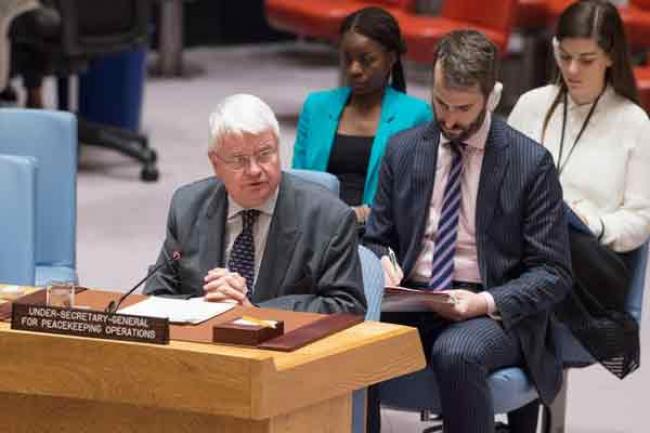Just Earth News 16 Feb 2017, 07:25 am Print

Eskinder Debebe
Particularly worrying were clashes between the Front populaire pour la renaissance de la Centrafrique and the Union pour la paix en Centrafrique groups in the country’s central region which had assumed ethnic overtones, said Hervé Ladsous, Under-Secretary-General for Peacekeeping in his briefing to the 15-member Council.
He added that the two groups were outside an ongoing dialogue, established by the country’s President, Faustin Archange Touadera, with other armed groups which was making progress in such areas as disarmament, demobilization and reintegration.
In the briefing, the UN official further said that the organization supported an initiative for a national peace and reconciliation agreement recently launched by the African Union, the Economic Community of Central African States (ECOWAS) and the International Conference on the Great Lakes Region, as well as Angola, Chad and the Congo.
Similarly, adapting to the changes, the UN mission in the country (MINUSCA) is rearranging its deployment to ensure greater flexibility and dedicate more forces to its operations.
Also, the Portuguese rapid reaction force is now in place and French surveillance drones will be deployed to deter activities of armed groups.
On the humanitarian side, Ladsous voiced concern, particularly for the areas outside the capital. He informed the council that more than half of the population (over 2.2 million people) faced food insecurity and more than 100,000 had been newly displaced.
Furthermore, with 31 per cent of global security incidents involving non-governmental personnel reported in CAR in 2016, the country remained particularly challenging for aid workers.
Going forward, he urged the international community to continue to support the CAR, and pointed out that, all too often, it reacted at the height of a crisis, only to exit before economic development had taken root and human rights had been assured.
Also briefing the Council on Wednesday, Omar Hilale, the Permanent Representative of Morocco to the United Nations and the Chair of the Central African Republic configuration of the Peacebuilding Commission echoed Ladsous concerns regarding the security situation.
Recent clashes in which hundreds were killed and thousands more displaced underscored the need to urgently address the security challenges, he stressed.
Further, Hilale also hailed the Government’s adoption of a national disarmament, demobilization, reintegration and repatriation strategy, a security policy, and a five-year capacity-building and development plan, and called on the to tackle the root causes of the conflict and urged the international community for their support.
He also informed the Security Council that an international conference on the CAR, held in the Belgian capital, Brussels, in November last year generated $2.2 billion in pledges and spoke of the Peacebuilding Commission’s work in the country.
- India rejects allegations, urges Pakistan to tackle its ‘home-grown ills’
- Massacre in Islamabad: ISIS takes responsibility for deadly Pakistan blast
- Friday turns fatal: 31 dead, 169 injured in shocking Pakistan mosque blast
- Explosion at packed mosque in Pakistan turns Friday prayers into scene of carnage, 15 dead
- Security forces handicapped: Pakistan Defence Minister’s shock admission on Baloch violence





-1763561110.jpg)
